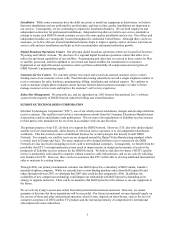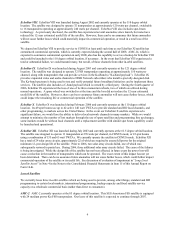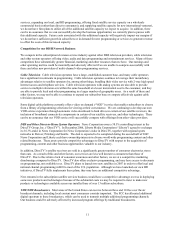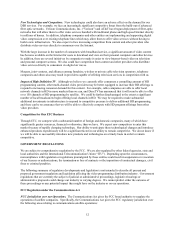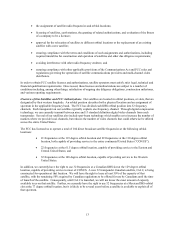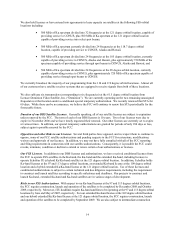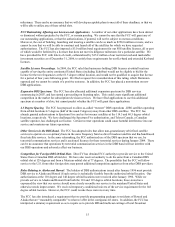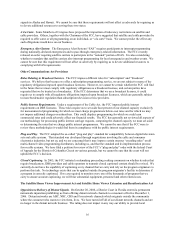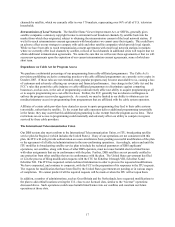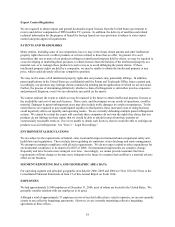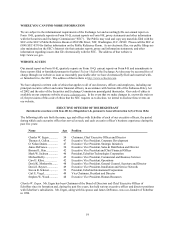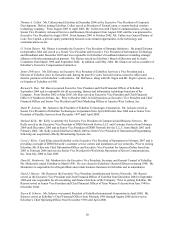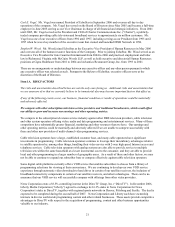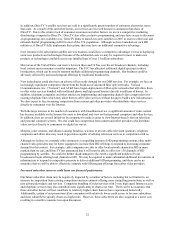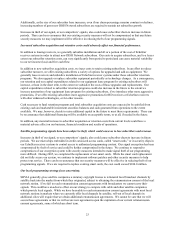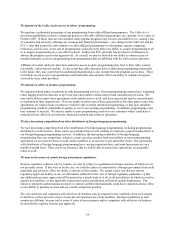Dish Network 2006 Annual Report Download - page 25
Download and view the complete annual report
Please find page 25 of the 2006 Dish Network annual report below. You can navigate through the pages in the report by either clicking on the pages listed below, or by using the keyword search tool below to find specific information within the annual report.15
milestones. There can be no assurance that we will develop acceptable plans to meet all of these deadlines, or that we
will be able to utilize any of these orbital slots.
FCC Rulemaking Affecting our Licenses and Applications. A number of our other applications have been denied
or dismissed without prejudice by the FCC, or remain pending. We cannot be sure that the FCC will grant any of
our outstanding applications, or that the authorizations, if granted, will not be subject to onerous conditions.
Moreover, the cost of building, launching and insuring a satellite can be as much as $250.0 million or more, and we
cannot be sure that we will be able to construct and launch all of the satellites for which we have requested
authorizations. The FCC has also imposed a $3.0 million bond requirement for our FSS satellite licenses, all or part
of which would be forfeited by a licensee that does not meet its diligence milestones for a particular satellite. We
have provided the FCC with letters of credit, collateralized by $15.2 million of our restricted cash and marketable
investment securities as of December 31, 2006, to satisfy these requirements for our Ka-band and extended Ku-band
licenses.
Satellite License Proceedings. In 2004, the FCC ruled that businesses holding DBS licenses at orbital locations
capable of serving the entire continental United States (including EchoStar) would not be eligible to bid for the
license for the two frequencies at the 61.5 degree orbital location, and would not be qualified to acquire that license
for a period of four years following grant. We filed a request for reconsideration of this ruling, which Dominion
opposed and we cannot be certain of a positive outcome. In addition, the FCC has placed a moratorium on new
DBS applications.
Expansion DBS Spectrum. The FCC has also allocated additional expansion spectrum for DBS services
commencing in 2007, and has started a proceeding on licensing rules. This could create significant additional
competition in the market for subscription television services. We have filed applications to use this additional
spectrum at a number of slots, but cannot predict whether the FCC will grant these applications.
4.5 Degree Spacing. The FCC has proposed to allow so-called “tweener” DBS operations –DBS satellites operating
from orbital locations 4.5 degrees (half of the usual 9 degrees) away from other DBS satellites. The FCC has
already granted authorizations to Spectrum Five and us for tweener satellites at the 114.5 and 86.5 degree orbital
locations, respectively. We have challenged the Spectrum Five authorization, and Telesat Canada, a Canadian
satellite operator, has challenged our license. Certain tweener operations could cause harmful interference into our
service and constrain our future operations.
Other Services in the DBS Band. The FCC has adopted rules that allow non-geostationary orbit fixed satellite
services to operate on a co-primary basis in the same frequency band as direct broadcast satellite and Ku-band-based
fixed satellite services. In the same rulemaking, the FCC authorized use of the DBS spectrum that we use, by
terrestrial communication services and it auctioned licenses for these terrestrial services during January 2004. There
can be no assurance that operations by terrestrial communication services in the DBS band will not interfere with
our DBS operations and adversely affect our business.
Competition for Foreign DBS Orbital Slots. DirecTV has obtained FCC authority to provide service to the United
States from a Canadian DBS orbital slot. We have also received authority to do the same from a Canadian DBS
orbital slot at 129 degrees and from a Mexican orbital slot at 77 degrees. The possibility that the FCC will allow
service to the U.S. from other foreign slots may permit additional competition against us from other DBS providers.
Rules Relating to Alaska and Hawaii. The holders of DBS authorizations issued after January 1996 must provide
DBS service to Alaska and Hawaii if such service is technically feasible from the authorized orbital location. Our
authorizations at the 110 degree and 148 degree orbital locations were received after January 1996. While we
provide service to Alaska and Hawaii from both the 110 and 119 degree orbital locations, those states have
expressed the view that our service should more closely resemble our service to the mainland United States and
otherwise needs improvement. We received temporary conditional waivers of the service requirement for the 148
degree orbital location. However, the FCC could revoke these waivers at any time.
The FCC has also introduced a requirement that we provide programming packages to residents of Hawaii and
Alaska that are “reasonably comparable” to what we offer in the contiguous 48 states. In addition, the FCC has
interpreted a statutory requirement so as to require us to provide HD and multicast carriage of local broadcast


